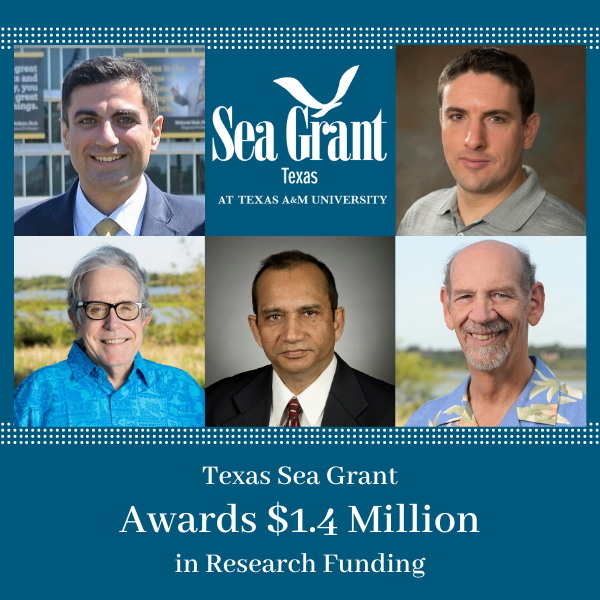Texas Sea Grant Awards $1.4 Million in Research Funding to Support the Texas Coast
The grants support research in natural, physical, social, behavioral and economic sciences and engineering that can positively impact Texas and its citizens.
The Texas Sea Grant College Program is a collaboration of the National Oceanic and Atmospheric Administration (NOAA), the State of Texas and universities across the state.
Texas Sea Grant’s team includes administrative staff, program coordination, communications, and extension agents along the Texas coast.
Coastal Science. Community Solutions.
Peer-reviewed publications, resources, and materials.
Volunteer organization of citizens in science, workforce, and education advising on important matters related to TXSG.
Texas Sea Grant partners with many local, government, non-profit, education, and industry organizations.
Texas Sea Grant maintains an extensive network of partnerships spanning federal, state, regional, academic, non-profit, and industry sectors.
Texas Sea Grant’s open positions.
Supports healthy ecosystems by education and outreach, programming, and events on sustainable practices.
Supports development of innovative policies, institutional capacities, and management approaches that increase community resilience.
Promotes environmental literacy by supporting students and the workforce through the development of STEM educational programs, tools, and products.
Works to ensure safe, secure, and sustainable supplies of domestic seafood and decrease our reliance on seafood imports, and support healthy fish stocks and vibrant recreational fisheries
Texas Sea Grant’s outreach serves the communities and regions of the Texas coast. Science for the sustainable management and conservation of Texas’ coastal and marine resources is central to Texas Sea Grant’s mission.
Extension is a two-way transfer of knowledge between researchers and community stakeholders.
Providing science-based programs across all educational levels, enhancing STEM learning in marine-related fields.
Supports innovative, science-based solutions to address environmental, economic, and social challenges.
Texas Sea Grant welcomes the help of the community to help monitor, protect, and clean our coasts.
Trainings, Workshops, Advising, Certification and Technical Assistance.
Find out if Texas Sea Grant is hosting, attending, or leading an event in your area.
Texas Sea Grant supports marine- and coastal-related research at universities across the state through a competitive grant program.
Texas Sea Grant will continue to support cutting-edge research in the areas of marine-related energy sources, climate change, coastal processes, energy efficiency, hazards, storm water management and tourism.
Monthly Texas Sea Grant newsletter.
Get Hooked, quarterly Fisheries, Aquaculture, and Seafood newsletter
Annual magazine about education, outreach, and research supported by Texas Sea Grant.
The Texas Sea Grant College Program is a collaboration of the National Oceanic and Atmospheric Administration (NOAA), the State of Texas and universities across the state.
Texas Sea Grant’s team includes administrative staff, program coordination, communications, and extension agents along the Texas coast.
Coastal Science. Community Solutions.
Peer-reviewed publications, resources, and materials.
Volunteer organization of citizens in science, workforce, and education advising on important matters related to TXSG.
Texas Sea Grant partners with many local, government, non-profit, education, and industry organizations.
Texas Sea Grant maintains an extensive network of partnerships spanning federal, state, regional, academic, non-profit, and industry sectors.
Texas Sea Grant’s open positions.
Supports healthy ecosystems by education and outreach, programming, and events on sustainable practices.
Supports development of innovative policies, institutional capacities, and management approaches that increase community resilience.
Promotes environmental literacy by supporting students and the workforce through the development of STEM educational programs, tools, and products.
Works to ensure safe, secure, and sustainable supplies of domestic seafood and decrease our reliance on seafood imports, and support healthy fish stocks and vibrant recreational fisheries
Texas Sea Grant’s outreach serves the communities and regions of the Texas coast. Science for the sustainable management and conservation of Texas’ coastal and marine resources is central to Texas Sea Grant’s mission.
Extension is a two-way transfer of knowledge between researchers and community stakeholders.
Providing science-based programs across all educational levels, enhancing STEM learning in marine-related fields.
Supports innovative, science-based solutions to address environmental, economic, and social challenges.
Texas Sea Grant welcomes the help of the community to help monitor, protect, and clean our coasts.
Trainings, Workshops, Advising, Certification and Technical Assistance.
Find out if Texas Sea Grant is hosting, attending, or leading an event in your area.
Texas Sea Grant supports marine- and coastal-related research at universities across the state through a competitive grant program.
Texas Sea Grant will continue to support cutting-edge research in the areas of marine-related energy sources, climate change, coastal processes, energy efficiency, hazards, storm water management and tourism.
Monthly Texas Sea Grant newsletter.
Get Hooked, quarterly Fisheries, Aquaculture, and Seafood newsletter
Annual magazine about education, outreach, and research supported by Texas Sea Grant.
The grants support research in natural, physical, social, behavioral and economic sciences and engineering that can positively impact Texas and its citizens.
Feb 24, 2020 By Sara Carney
2 minutes

Texas Sea Grant
The Texas Sea Grant College Program at Texas A&M University has awarded five new research grants totaling $1.4 million for two-year research projects. The grants will fund researchers at universities around the state to support coastal and marine ecosystems, communities and economies.
Through partnerships with the State of Texas and the National Oceanic and Atmospheric Administration, Texas Sea Grant conducts a competitive research grant program every two years that draws on the expertise of the state’s top scientists. Funded projects are selected using a competitive and rigorous peer-review process that considers the project’s potential to produce substantial and beneficial impacts to society and its ability to integrate research and extension efforts.
Projects must also align with Texas Sea Grant’s strategic plan and four focus areas: Resilient Communities and Economies, Sustainable Fisheries and Aquaculture, Healthy Coastal Ecosystems, and STEM (science, technology, engineering and math) Education and Workforce Development.
Awards for the 2020 – 2022 period are:
According to Texas Sea Grant Director Dr. Pamela T. Plotkin, “These new research grants will support outcome-oriented research that span the natural, physical, social, behavioral and economic sciences and engineering while generating substantial positive impacts for the people, economy and ecosystems of Texas.”
